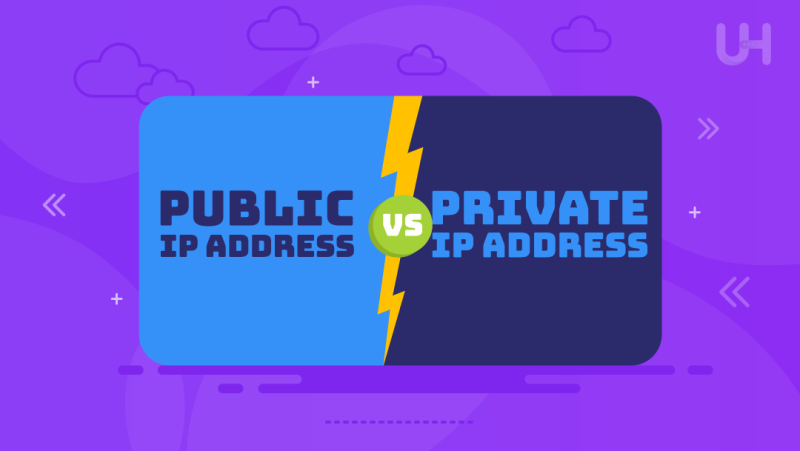Have you ever thought of the unique addresses your devices are given when connected to the internet or to a home network? Consider this for a moment; in the same way, your public IP address is accessible to everyone just like your home’s street address and a private IP address is only accessible to those within the home network just like a room number within the house.
In this blog, we are going to explore the difference between Public and Private IP addresses in layman’s terms along with their importance in the digital world.
Public IP Addresses
Public IP addresses function as the digital passports for each and every device that connects itself to the internet. They act as the identifiers to help know what device belongs to whom and these devices are termed as “public IP”. They are indeed global in nature because no two devices can have a similar public IP address at the same time. In addition to that, such IP addresses can be routed on the internet, allowing data packets get transmitted between different networks.
Public IP addresses are usually given out to customers by their Internet Service Providers (ISPs). Whenever you get subscribed to an internet service plan, your ISP will provide a public IP address to your home or router modem. This address is the point of entry for all devices in your home network to interact with the world outside.
Use Cases
Public IP addresses are also very important for different internet-based services and applications. For example, web servers host their websites, and email servers manage electronic mail. All of them use public IP addresses to interact with clients all over the region. They are equally important in the case of online gaming through gaming VPS server, video streaming via VDS hosting, or remote access to the networks.
Public IP addresses are the skeleton structure of any conversation in the internet world. Also, allows interruption-free connections and data transfer between numerous devices and networks all over the world. They foster the proper functionality of a great number of services offered online which ensures smooth information flow. Public IP addresses allow users access while browsing the internet, sending emails, and so on. Public IP addresses perform the work without the users noticing.
Private IP Addresses
As compared to Public IP addresses that can be accessed from anywhere on the internet, Private IP addresses are restricted to specific local networks for enabling communication among devices. This makes them akin to the internal addresses of a building that are only known within its walls. Unlike Private IP addresses, public can be traversed over via the internet. However, it is not possible to them directly from a local network. They only function as local identifiers for devices.
In most cases, private IP addresses within local networks are allocated through Dynamic Host Configuration Protocol or DHCP. The moment a device connects to a network, the DHCP server allocates a private IP address located within pre-defined ranges. Network administrators have the option of manually assigning private IP addresses. This provides a higher level of control and consistency for network configurations.
Use Cases
Within both home networks and corporate intranets, Private IP Addresses are heavily used. A home network includes smart home devices, printers, smartphones, and computers which can seamlessly interact using private IP addresses assigned to them by the home router. Internal workstations, servers, and other networked devices are also able to function with private IP addresses, enabling seamless communication across the local network.
Private IPv4 addresses are very useful for enabling communication on local networks. It allows devices to communicate, share information, and utilize resources without the threat of being tapped into from the internet. They ensure safe and clear methods of communication on networks. Additionally, it ensures that all internal traffic stays strictly within the local environment.
Upgrade Your Networking with Dedicated IP Servers!
Would you like to refine your networking expertise? Check out Ultahost’s dedicated IP servers. They are designed to enhance server performance and security. Additionally, improve your online experience and learn more now!
What is the Difference between Public and Private IP Addresses?
Accessibility
The distinguishing factor between public and private IP addresses is the extent to which they are available. Public IP addresses have no restrictions and are reachable from anywhere via the internet. These serve as the gateway address to the incoming traffic connection to the network, allowing communication with available devices in different networks. Conversely, available addresses in a specific local network are referred to as private IP addresses. These cannot be reached from the internet directly and act as a mark for devices connected to the network.
Network Communication Impact: The classification difference between public and private IP addresses impacts network communication. Public IP addresses permit devices to connect with external networks and online services as well as exchange information with devices located on the internet. Alternatively, private IP addresses allow communication within a local network. Moreover, they enable devices to communicate and make use of shared resources without being exposed to outside networks.
Uniqueness
Another critical distinction is the unrestricted identifiers of public and private IP addresses. Public IP addresses are required to be unique throughout the globe. That means, no two devices connected on the internet should have the same address at the same time. Internet authorities make sure this address uniqueness rule is followed in order to avoid conflicts and facilitate smooth data transfer over the Internet. On the other hand, private IP addresses only need to be unique within a local area network. Private IPs issued to devices in different local networks can be identical without any issue, provided those devices are not directly connected to each other.
Resolving Addressing Gaps and Problems: The public IP address’s uniqueness requirement helps avoid problems associated with addressing conflicts and collisions on the internet. If two devices tried to use a single public IP address, it would certainly create a communication error and /or network connectivity issues. On the other hand, private IP addresses are less conflictive because they are used in closed local networks. Nonetheless, there can still be problems when devices within the same local area network are given duplicate private IP addresses. More often than not, it can be solved through various network administrative means such as DHCP administration.
Routing
This is yet another area where private and public IP addresses differ. Public IP addresses are routed across the internet using global routing tables and is maintained by ISPs as well as infrastructure network service providers. Those addresses facilitate inter-network traffic between different networks and helps ensure that data packets are directed toward their accurate destinations efficiently. Meanwhile, private IP addresses are not routed on the internet, but rather reserved for intra-network communication within a local network that does not require global routing protocols.
Role in Network Routing and Forwarding: Public IP addresses are really important in network forwarding and routing. It functions as the destination and source points for data packets moving through the internet. Network routers rely on public IP addresses to make decisions concerning the next hop for packet forwarding towards the end destination. Private IP addresses are meant for local routing services within a given subnetwork. Within the local network, the routers make use of private IP addresses to forward packets between the various devices. Enables better and effective communication among the local network devices.
Privacy and Security Implications
Here are a few privacy and security implications for Public or Private IP addresses:

Security Considerations
Devices with Public IP addresses are susceptible to security risks due to the use of the Internet. Because public IP addresses are reachable from everywhere, they are prone to a number of cyber threats to your website, which include unauthorized access, hacking, Denial of service (DDoS) Attacks, and so on. Vulnerable devices accessible through public IPs become targets for attackers who seek to breach sensitive information, disrupt network operations, or compromise sensitive data.
Loss Protection Measures of Public IP Addresses: Organizations and Individuals as well can try various security measures such as Firewalls, IDS, and Security Patches against Malware Attacks to easily manage risks to Public IP Addresses. In addition, strong access controls, regular updates on software, firmware, and network monitoring check on traffic can improve the security position of devices containing Public IP Addresses.
Privacy Concerns
Anonymity is very elusive when one owns a public IP address as it sets off a myriad of security issues. The risk of security breaches is present because online devices, be it laptop or smartphone, uses a unique identification number, i.e. Public IP address. Such addresses can be utilized to keep tabs on users’ activities and access confidential details pertinent to them. Cybersecurity “experts”, malicious entities, and scam masters can use public IPs to invade one’s digital life, seize personally identifiable information, invade spaces one lives, and infest “tailored” phishing scams and malignant prone IPs on the user.
As a response to public IP addresses, the use of VPNs alongside proxy servers can mitigate identification and tracking by masking public IP addresses and encrypting data associated with internet that one accesses. Such tools go a long way in establishing anonymity thus increasing confidentiality.
Praying or supporting initiatives that advocate for accountability in data collection policies can greatly aid in protecting clients’ concerns in this technology-dominated society. Apart from that, assuming the threats shift the entire power to the users, individuals are not correct in thinking that surveillance-related issues will idle. Such active measures like reviewing and adjusting restrictions set on devices one uses, disabling which come along the internet service, and providing user-friendly sensitive data of the individual without condoning exposure, curtail IP address-related difficulties.
Conclusion
Public IPs can be likened to addresses that everyone can view, whereas private IPs are more like hidden codes only familiar within a network. Public IPs facilitate internet connectivity, whereas private IPs ensure seamless operations within a home or office network. Summarizing, distinguishing between Private and Public IP addresses plays a crucial role in maintaining one’s security online.
Want to improve your network infrastructure? Ultahost has a variety of hosting solutions to fit your requirements, including offshore hosting services. Check out our services today!
FAQ
What is an IP address?
An IP (Internet Protocol) address is a unique numerical label assigned to each device connected to a computer network that uses the Internet Protocol for communication. It serves as an identifier for devices, allowing them to send and receive data across networks.
How can you tell if an IP address is public or private?
You can determine whether an IP address is public or private by examining its range. Typically, IP addresses start with 10., 172.16. – 172.31., and 192.168. are reserved for private use and not routable on the internet, while all other IP addresses are public.
Why are public IP addresses necessary?
Public IP addresses are necessary for devices to communicate over the internet. They serve as the unique identifiers for devices on the global network, allowing them to connect to websites, servers, and other internet-based services.
What are the benefits of using private IP addresses?
By using private IP addresses within local networks, organizations can create isolated environments that are shielded from external threats. Private IP addresses also enable the efficient allocation of addresses within a network. Also, reducing the need for public IP addresses and conserving address space.









